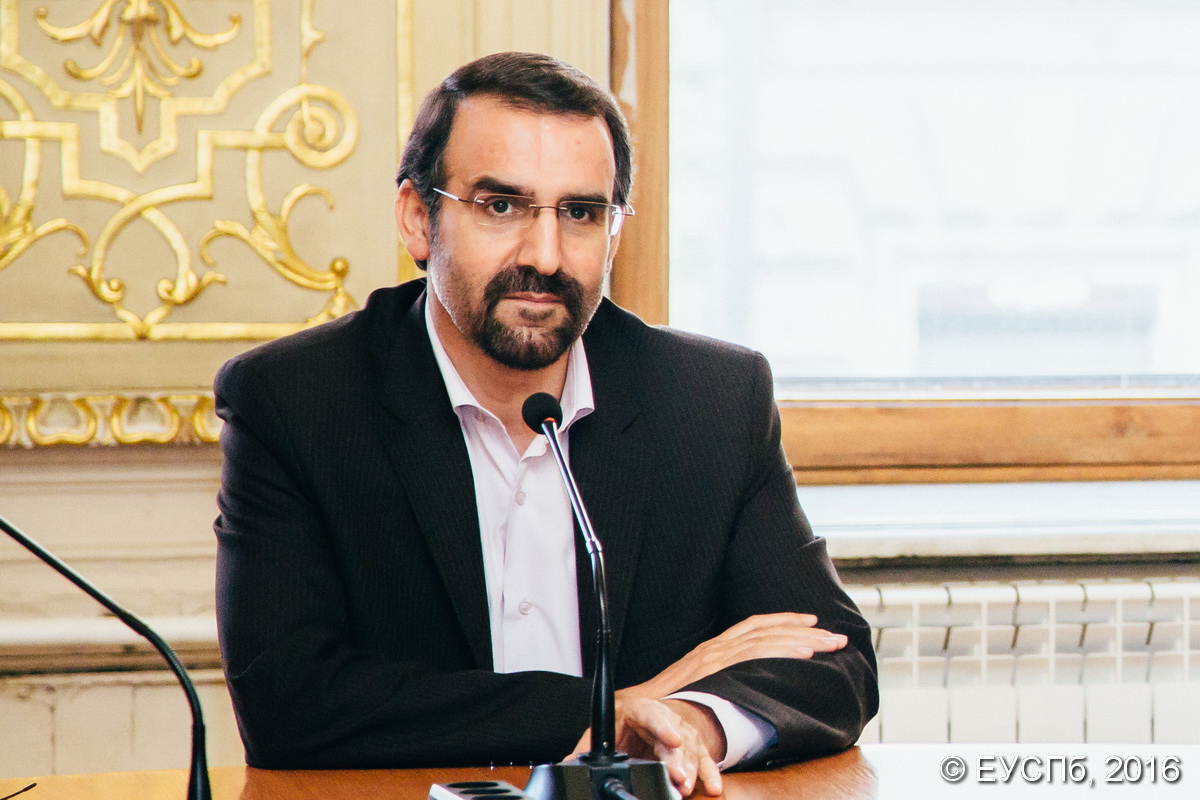by Zachary Waller, Gevorg Avetikyan
On April 8th, Mehdi Sanaei, Ambassador of the Islamic Republic of Iran to the Russian Federation, visited the European University at St. Petersburg to speak with students, faculty, and other members of the EUSP community. Mr. Sanaei covered a wide range of topics in his conversation at EUSP, but focused on Iran’s relations with Russia and the Soviet Union.
Relations between Iran and Russia have existed long before the USSR – two countries share a record of war and peace, contradiction and partnership
Generally relations between Russia and Iran in the second half of the 20th century up until current period can be divided into three large stages: between WWII and the Islamic Revolution in Iran; between the beginning of the 1980ies and the collapse of the USSR; and the modern stage of relations with Russia.
Throughout this period, Iran had several reasons to mistrust the USSR: the USSR did not want to draw its troops out of Iranian territory. At the same time, the Communists were quite a strong political force in Iran, a reason for Iran to be cautious. Iranian monarchy nevertheless had relations with the USSR – Mohammad Reza Shah has even paid two official visits to the USSR and the relations were generally better in the 1960s-late 1970s.
Iranian revolution changed the landscape at the end of the 1970ies. The Iran-Iraq war (1980-1988) became a new challenge, and Iranians did not appreciate the fact that not only the US but also the USSR was selling arms to Iraq. Thus, Iran has chosen to adhere to their own principle, put shortly as “Neither East, Nor West – Islamic Republic!”
The third stage of bilateral relations starts with the Soviet collapse. Throughout the past couple decades Iran has had different presidents (conservatives, reformers, moderates). Ambassador Sanaei identified three dimensions of Iran-Russia relations at this latest stage of their relations.
The International Dimension. Russia and Iran take similar positions in terms of world politics. Both nations stand for a multipolar world as opposed to creating a unipolar system of international relations.Both nations are against the application of double standards. “They tell Russia that Ukraine’s people should choose their own president, but we think the same should be in Syria. It should be the Syrians to decide, not the USA, Qatar, Saudi Arabia or Turkey,” – said Ambassador Sanaei. If the Arab Spring is possible in Egypt, it could be possible in Yemen and Bahrain as well.
The Regional dimension. One of the brightest examples of Russian-Iranian cooperation is overcoming the crisis in Tajikistan in the 1990s. The Central Asian republic was torn apart by the civil and it was joint efforts of Russia and Iran that helped to stabilize the situation. Russia and Iran have also co-operated to solve the Nagorno-Karabakh issue. Just recently, the foreign ministers of Iran, Russia and Azerbaijan met to discuss the conflict. Russia and Iran have cooperated in the Caspian Sea region as well. There is active ongoing cooperation in the Middle East, serious coordination in Syria
Bilateral dimension. Ambassador Sanaei started with pointing out that all possible elements of bilateral relations that could exist between two states (such as politics, economics, culture, academia) do exist and work between Iran and Russia. Therefore, “the Iranian Ambassador to Russia is a very busy man”. There is one negative thing, however: despite strategic nature of these relations, the volume of trade is not too big. Efforts are taken to improve this, there are many joint consultations, the presidents have met for seven times during the past two years. However, the turnover in bilateral trade is still below $2 bln.
For students in the ENERPO program, there was one more topic that really struck a chord: Sanctions
On June 28, 2012, the United States of America imposed sanctions on Iran in a bid to dissuade the Islamic Republic from pursuing its nuclear program. This sanctions regime targeted Iran’s central bank, punishing any bank, company or government doing business with it. Additionally, the American sanctions regime targeted the Iranian energy sector specifically, promising to punish anyone helping to grow it. Just a few days later, on July 1, 2012, the European Union placed an oil embargo against Iran. This, coupled with the United States’ sanctions, caused Iranian oil output to plummet.
While many of the sanctions on Iran were recently lifted, the topic was a hot one at Ambassador Sanaei’s visit, as the Russian Federation was placed under sanctions by the United States and European Union in March of 2014 in response to Russia’s annexation of Crimea.
For Ambassador Sanaei, sanctions are a terrible thing not to be wished upon any country. He specifically cited the Iranian experience, claiming the sanctions hurt the lowest in Iranian society, as many poor Iranians were unable to afford the medicines they needed to survive when the country was first placed under sanctions.
However, Ambassador Sanaei also pointed out there can be positive outcomes of sanctions. For example, as a result of the lack of access to medicine, Iran created a strong pharmaceutical industry that now exports large amounts of drugs. Additionally, before sanctions were imposed against Iran, 80% of the state budget was dependent on oil and gas. After the sanctions were finally removed, only 40% of the budget was dependent on oil and gas.
Ambassador Sanaei was also quick to point out the help Russia offered Iran while the country was under sanctions. He pointed out that when things were particularly bad in Iran, Russia was there trying to stabilize the situation. Additionally, Russia played a large part in helping to broker the nuclear deal that ultimately saw the sanctions lifted.
As for the current sanctions against Russia, the ambassador said he did not believe they were all that serious, with the exception being the sanctions related to access to the financial system (which he said are always painful). He said that Iran used to tell Russia there was nothing to be afraid of with sanctions, but noted Russian-Iranian trade was down 70% (by volume) as a result.
Sanctions look to be an important part of the Russia-Iran relationship. During the time of sanctions against Iran, it was Rosatom that helped Iran build its nuclear plants. Additionally, it was Russia that worked hard to get the sanctions lifted and get Iran back into the world system (just in time for Russia itself to be sanctioned).
Even though Russia is now under sanctions, Ambassador Sanaei noted that the Russian Federation is continuing to help Iran develop, with Russia announcing it will put $5 billion into various projects in Iran.
This is positive news for Iran, especially if some of that money goes to support Iran’s small natural gas industry. Unlike Russia, who exports huge amounts of natural gas, Iran has some of the world’s largest natural gas reserves but is responsible for less than 1% of the world’s natural gas trade. This is due to several factors, such as lack of LNG export terminals, lack of sufficient pipelines to export through, dearth of suitable neighbors to build pipelines through, and the lower quality of Iranian gas, which means it needs to be treated before being exported. However, even with all of those going against Iranian gas, there is one overarching point bearing the most responsibility: energy. With sanctions specifically targeting the energy sector, Iran simply could not develop its natural gas capabilities to anywhere near the level it could (and likely would) have otherwise.
Overall, Ambassador Sanaei provided a comprehensive view of Russian-Iranian relations and opened the eyes of many students who had never before heard such a perspective. So where are relations headed for the future? As countries with similar world outlooks (both desiring multipolar worlds and a decreased role of the United States) and similar experiences under sanctions (almost bonding them together), Iran and Russia look set to continue bettering relations.
The lecture was followed by a Q&A session
Olga Dragan: What are the reasons why relations between Russia and Iran do not expand?
Mehdi Sanaei: Chief reason is that both countries are primarily exporting energy resources. Both are struggling with dependence on energy export revenues. Iran has progressed significantly. 80% of its budget used to be dependent on oil and gas exports, but in the 2015 budget that share was decreased to below 40%. In terms of agriculture, for example, Russia exports what Iran needs to import (grain, corn etc), and Iran exports things Russia needs (fruits, for example). We are solving the issue to make it possible for Iran to also export meat, dairy (milk etc) and other products to Russia.
Alfrid Bustanov: There are about 20 million Muslims in Russia. Is that a factor of bilateral relations, or do you take Russia as a country where only Russians (meaning the ethnic Russian/Orthodox) live?
Mehdi Sanaei: When we speak of factors affecting our relations, we do take into consideration that there are Muslims here. We are an Islamic country, we pay attention to Muslims wherever they are. Putin is very constructive in his approach to Muslims and that positively affects our relations. Russian Muslims have traditional ties with Iran, especially those in the Caucasus, Central Asia, Tatarstan, Bashkortostan.
Aaron Wood: After lifting of sanctions Iran will try to regain its share in hydrocarbons market in Europe, how can this affect Russia-Iran relations?
Mehdi Sanaei: When we study Iran-Russia relations, we talk about negative effects of third sides. We believe bilateral relations should be originally developed, not affected by third sides. We hope Russia-Iran relations will develop on a side, on their own.
Pierre Jouvellier: There are reports of a $7bln weapons sale deal, can you comment more about cooperation in the defense sector?
Mehdi Sanaei: Relations are varied. For example, Iran supplies Russia with fruits, dried fruits, raisin, nuts, carpets, construction materials. Iranian cars (Iran Khodro) for middle-class Russians used to be exported. Iran also exports pharmaceuticals. Iran imports some agricultural products from Russia.
Russia has traditionally been active in two spheres: construction of power stations and railroads. In the past years, we have signed contracts for nuclear power plant construction, the modernization of Iran’s railroad system. We’re working on the realization of a $5 bln credit fund by Russia to support Iranian-Russian projects.
Alexander Kamprad: Russia is critical about the way Germany treats the migrant crisis. What would your comment be
Mehdi Sanaei: Iran has had migrants from Afghanistan and Iraq. Millions of them, especially from Afghanistan. There were no mass migrations from Syria though. For some reason everyone wants to go to Europe, not even the Arabic-speaking Persian Gulf states, only Europe.

